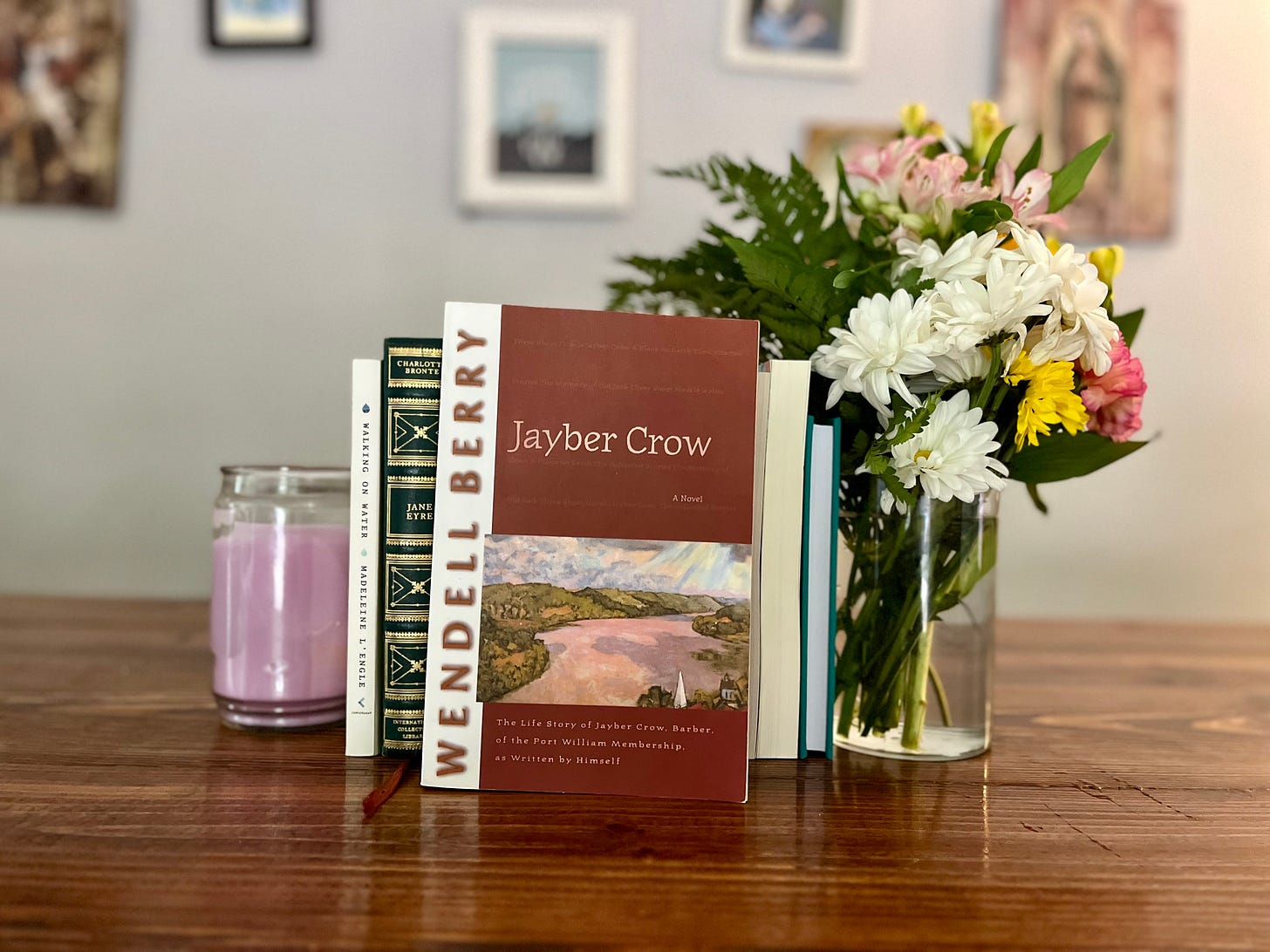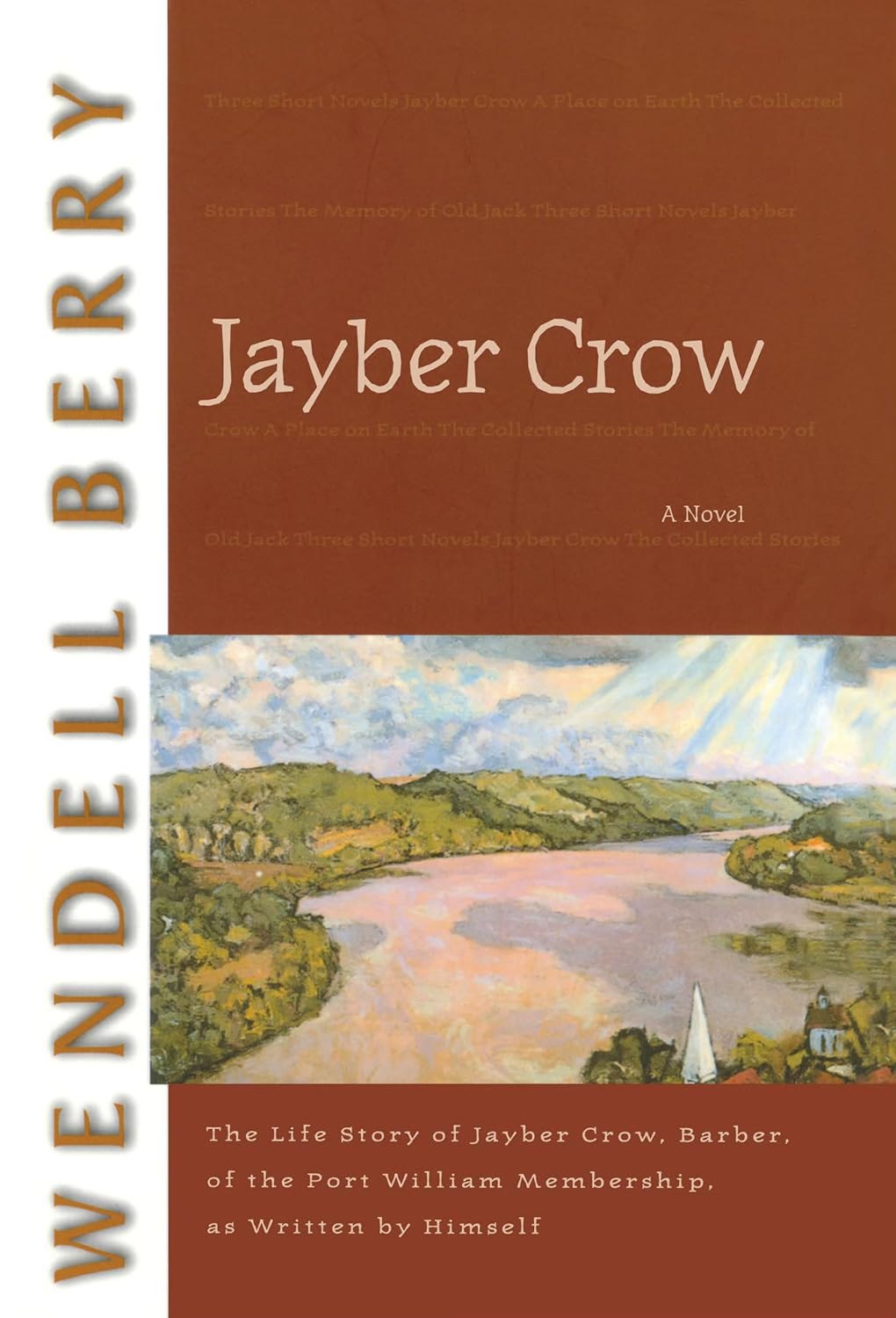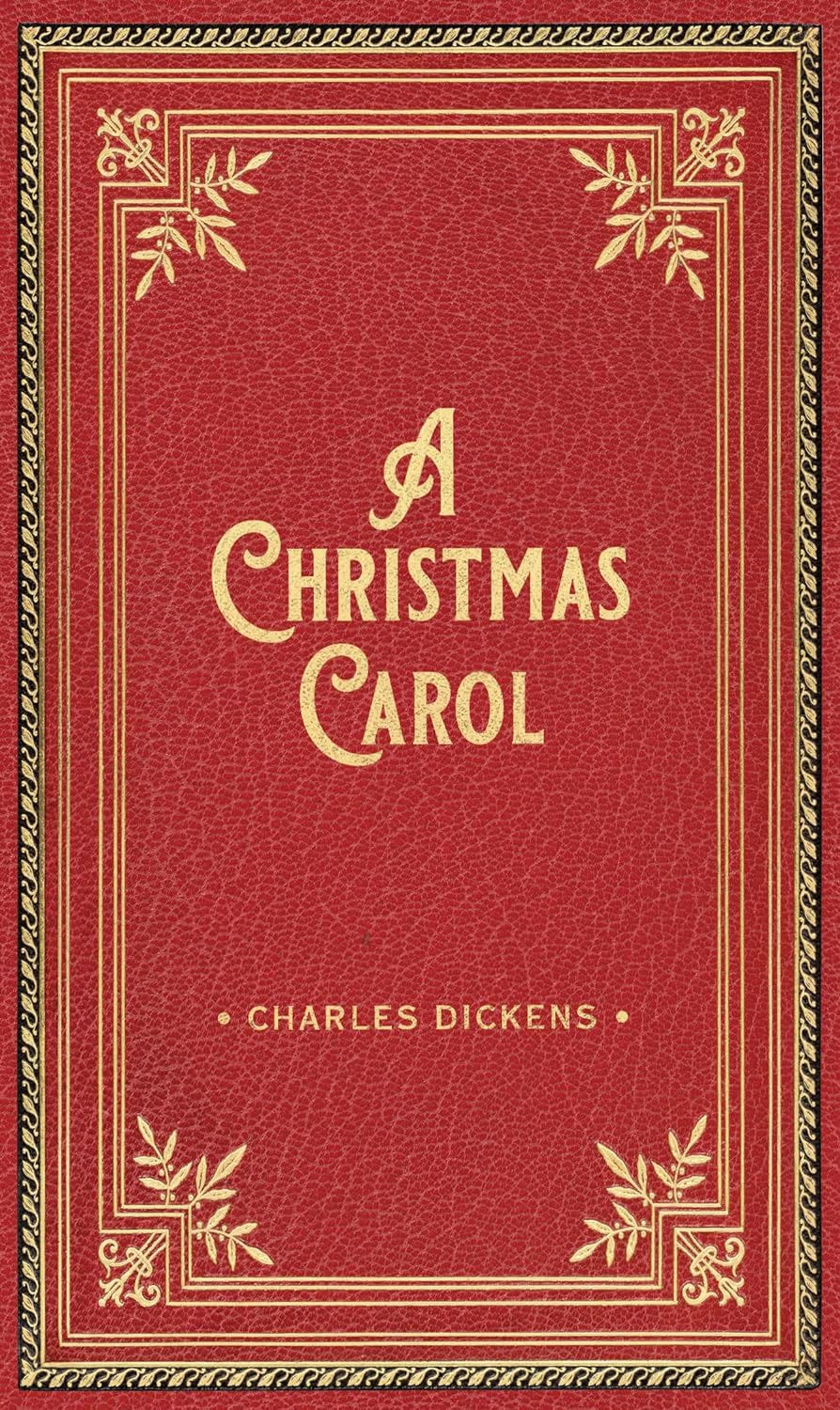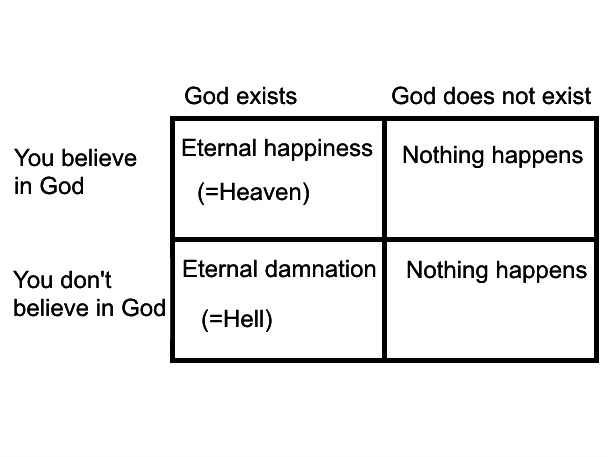Jayber Crow Part I
In which we find ourselves back in Port William meeting new and old friends
Welcome to Reading Revisited, a place for friends to enjoy some good old-fashioned book chat while revisiting the truth, beauty, and goodness we’ve found in our favorite books.
Hello Fellow Readers,
I have had a lovely week diving back into the world of Port William and meeting our new friend Jayber Crow. This book has been a slow burn (I can’t remember if I have
or to thank for that description of Wendell Berry fiction, but it is apt). After reading Jane Eyre and a few other novels at a very quick pace, this one has slowed me down in the best way. I am enjoying how Berry’s writing can ground me a little bit more in reality and I’m sure this is the pace that I should be living life (and maybe reading some books too).Usually at Reading Revisited we lead you through a book that we have already read. I like to think of these reading guides as a way for you to have some insights from a “revisiting” on your first read. However, this time this is my first read as well. I have spent time with Wendell Berry in Port William, but I have never read Jayber Crow and don’t feel as I’ve gotten to know him as a character in other books either.
So, my goal with these posts is to show you how I read a new to me book and maybe help you hone your reading practices along with me. They say that writing is thinking slowly, so I hope these posts will give you some insight into my mind as I read this new to me book along with you all.
Check out the schedule if you want to read along with these posts!
Now, lets jump into the text of this week’s reading…
A Few Notes on the Book
This is another first person narrator just like Jane Eyre.
This novel takes place in the fictional town of Port William, Kentucky along with most of Berry’s other novels. A lot of characters come into each other’s books so you may see some people you know from Hannah Coulter (or other Port William novels and short stories). It is not important to read the books in any order, so don’t feel like you are missing anything by reading Jayber first (even though it was published the most recently
Wendell Berry puts this in the front of the book…
NOTICE
Persons attempting to find a “text in this book will be prosecuted; persons attempting to find a “subtext” in it will be banished; persons attempting to explain, interpret, explicated, analyze, deconstruct, or otherwise “understand” it will be exiled to a desert island in the company only of other explainers.
BY ORDER OF THE AUTHOR
And with that I start writing this read along guide with fear and trembling…
Chapter by Chapter
1: The Barber in Port William
In this first chapter we are introduced to Jayber Crow, the barber of Port William, Kentucky. We are slowly drawn into the world of this small town through his memories and impressions. He talks about his day to day life at the barbershop and then tells three stories about events he witnessed from watching the town. He then introduces us a bit more to Ab Rowanberry, Fee Berlew, and Mattie Keith (I mean Chatham).
Things to Note:
Jayber keeps referring to Mattie by her maiden name.
But I saw Mattie Keith then, and after that I would be aware of her. Seeing her as she was then, I might have seen (had I thought to look) the woman she was to be. Or is it because I knew the woman that I see her now so clearly as a child? (10)
Jayber has left Port William and we don’t know why…will this be the “conflict” of the story?
Stories within stories are always significant. So I find myself asking, why these three stories?
Plunger on the head
Is there significance to Portly being under the car when it happens and struggling getting out?
It appeared that he was trying to drag himself out by the head. (5)
Drunk singer versus the truck
I love the image of the powerful truck going up against a singing drunk man. We expect Fee to get hurt and in the end he is (trying) to put the truck back in its place. This is a good example of a story communicating a deeper truth than an essay. I can’t exactly put my finger on what this is communicating, but the story has made an impression on me.
The driver then reconcentrated his forces and blew the horn, a long exasperated bleat that disparaged Port William and all it stood for. (6)
Batting with a violin
I am not sure how this story fits in, except that I now have an image of an injured instrument that seemingly still works even though it has been marred. Again, Wendell Berry’s storytelling ability leaves a lasting impression on me, even in these seemingly random incidents.
Characters we’ve met…
Ab Rowanberry- travels between his daughters
Fee Berlew- the drunken singer in the story above
These first two seem significant because we find out later that Jayber is now in the last days of his life so he seems to be thinking about other old men and their lives and troubles.
Mattie Keith- Jayber’s love interest
I am not sure where we will go with Mattie because she is only a middle schooler when he meets her and it seems clear that she marries someone else, but still has a place in Jayber’s mind all these years later.
2: Goforth
This chapter is named after the town where Jayber was born. He tells us about his parents and the short lived time he had with them. He was born right before the war. He remembers a lot of turmoil early in his life due to the war and a huge snowstorm that caused problems when it fell and then more problems when it melted. At the end of the chapter he tells how his parents died and his Aunt Cordie adopted him. We also find out that present day is 1986.
Things to Note:
The weather seems to be an objective correlative to Jayber’s emotional and physical state. This reminds me a lot of Jane Eyre, even though these are very different books.
Wendell Berry seems to be doing a good job of making this chapter seem a little bit more hazy because Jayber’s memories of it would be as he was so young and there was so much trauma involved. Reading it has me wanting to get back to Port William, which is genius on his part!
3: Squire’s Landing
In this chapter we learn all about Jayber’s life with Aunt Cordie and Uncle Othy (the Daggets) at Squire’s Landing. We learn about the destruction of the land post the ice melting flood. We are introduced to neighbors, the town, and the river (and learn that Jayber is living back along the river in the present day). By the end of the chapter Aunt Cordie and Uncle Othy have both died and Jayber is orphaned for a second time.
I was a little past ten years old, and I was the survivor already of two stories completely ended. (28)
Things to Note:
So many of Berry’s chapter titles are places.
The connection of the war with the ruined land is so interesting. Berry gives visuals that stay with me. It also seems significant that the worst of the weather is over but the land is still seeing the effects..this seems to be an objective correlative for Jayber’s life.
We get another story within the story about the boat being up on the ice and the spring warmth bringing it gently down.
The story about the dirty joke is funny, but I am wondering if there is something deeper to it as well.
I’m reminded of the theme of membership when I see the responsibility they have to the neighbors and vice versa. He also calls so many people Aunt and Uncle, which for someone with so little family seems significant.
The New Port William (in the new Heaven and Earth) that is referenced in Hannah Coulter seems to be alluded to here as well. Aunt Cordie talking to Uncle Othy reminds me a bit of the end of Hannah as well.
4: The Good Shepherd
Telling a story is like reaching into a granary full of wheat and drawing out a handful. There is always more to tell than can be told. (29)
In this chapter we hear about Jayber’s time at an orphanage called The Good Shepherd run by a man called Brother Whitespade. This is where Jayber’s name is shortened to J. Here he receives an education and a “home” in some sense but he says he never belonged there and thence has very few memories to share. He doesn’t do well in school, but does take to reading fiction in the library.
Things to Note:
Berry’s description of Whitespade’s desk is a great example of his ability to help me see with Jayber.
Whitespade brings up Jayber’s namesake, Jonah from the Bible, which has me wondering if he will have his “Ninevah” or some similar call.
Brother Whitespade reminds me of a kinder Brocklehurst from Jane Eyre
The remaining to his first initial seems dehumanizing. But, we know that in Port William they end up giving him a nickname, which seems to be a way to belong somewhere and to be even more human. This gives me hope.
The way he describes The Good Shepherd was convicting for me…anyone else?
Within itself, it was divided between an ideal world of order, as prescribed and demanded by the institution, which was embodied most formidably by Brother Whitespade, and a real world of disorder, which we students brought with us as a sort of infection. (32)
Jayber is reading orphan stories in the library which have a long literary tradition starting with mythology (demigods) to ones we recognize like Dickensian orphans. In these stories they are usually lost with some token of recognition and then found (in some way) by the end. I am wondering how Berry will use this tradition with Jayber.
I am paying attention to the words Jayber “keeps” and seeing how they play out in the story.
Is is story about E. Lawler foreshadowing Jayber’s welcome into the membership of Port William?
5: The Call
Here we have our first chapter title that is not a place. We find out that The Good Shepherd is so protected from the outside world that it even has its own barbershop and Jayber ends up apprenticing under the barber there. Shortly after this he tells us that he thought he might have a calling to be a minister (and also to live in the countryside with a wife). He has his own little Pascal’s Wager1 moment and decides he better become a minister just in case he missed the call.
Things to Note:
The Barbershop
It is interesting that his apprenticeship at the barbershop comes right before his possible call to the ministry.
He seems much happier with the good work to do.
I am also wondering if this barbershop will provide some foreshadowing for the barbershop in Port William.
There are a lot of references to the biblical story of Samuel (and I am still tracking the Ninevah story).
This quote about the preachers reminded me of St. John from Jane Eyre…
Not one of those men had ever suggested that a person could be ‘called’ to anything but ‘full-time Christian service,’ by which they meant either the ministry or ‘the mission field.’ (43)
6: Pigeonville
So, Jayber goes to seminary to fulfill his (possibly unheard) call to the ministry. He finds himself in school again but with much more freedom and therefore follows the rules more. He is waiting tables at the girls’ dormitory, which is a bit funny after his comment about finding a wife. This seems like it could be a great place for him but he still feels outside of the community. He starts to question the doctrine being taught at the school and doesn’t receive many good answers so he decides that not only is he not called to the ministry, but he must not be a Christian at all. I quote the below passage between Jayber and a teacher because I think it should guide how we read the rest of the book.
I said, “Well,” for now I was ashamed, “I had this feeling maybe I had been called.”
“And you may have been right. But not to what you thought. Not to what you think. You have been given questions to which you cannot be given answers. You will have to live them out— perhaps a little at a time.”
“And how long is that going to take?”
“I don’t know. As you as you live, perhaps.”
“That could take a long time.” (54)
Things to Note:
This is another huge change for such a young man. He keeps no relationships with the people he has left behind. I feel his placeless-ness and him loneliness.
I love Jayber’s thoughts on if he could read all the books before he dies…
I’d had an idea, once, that if I could get the chance before I died I would read all the good books there were. Now I began to see that I wasn’t apt to make it. This disappointed me, for I really wanted to read them all. But it consoled me in a way too; I could see that if I got them all read and had no more surprises in that line, I would have been sorry. (47)
I think it is significant that part of his discernment out of the ministry is that he doesn’t recognize the name “Brother Crow.”
The rift between body and soul in the theology of the college (pg. 49) reminds me of St. John in Jane Eyre. These books are written 200 years apart and still talking to each other.
Is Jesus’ prayer being ignored a foreshadowing for Jayber’s life?
After you have said “thy will be done,” what more can be said? And where do you find the strength to pray “thy will be done” after you see what it means? (51)
We have more Jonah and Dante allusions to pay attention to on page 52.
How does Berry make this so meaningful without crossing the line into sentimentality?
7: The Great World
Jayber leaves the college and heads for Lexington. Sam Hanks, a man from Port William, picks him up. He drops him off and tells him to go to the trotting tracks and secretly gives him a five dollar bill. He works odd jobs at the tracks but is still friendless until one day he decides to give up eating so that he can get a haircut. Instead of just getting a haircut he learns that the local barber, Skinner Hawes, needs a partner and starts working for him that day. He also decides to take classes at the university. His “solitariness turned to loneliness” and he has no desire to rise about his orgins anymore, but wants to “sink back into them.” He packs up without saying goodbye to anyone and heads toward Louisville.
Things to Note:
Jayber takes on a secret identity when riding with Sam Hanks like orphans in stories. Will he be discovered?
Jayber’s lack of plan in setting out both times feels a bit like Jane Eyre.
Independent was one of Jayber’s saved words…Sam Hanks is this. We should watch out for this coming up again with other characters.
We meet many of Wendell Berry’s favorite themes here: Calling, Providence, and Time.
Jayber’s mediations on his literature classes and the university system are so interesting and worth meditating on further.
8: The Gathering Waters
Jayber sets off, allegedly, to see the floods that the newspaper has been reporting on in Louisville. Part of the way there he realizes that he has to get back to his people (in order to do this he must cross a dangerous bride in the midst of the floods). His belief seems to be starting to come back to him when he meditates on the spirit of God hovering over the face of the waters at creation. He stays as a refugee at the capitol building and then finally makes it close to Squires Landing. There he sees Burley Coulter (Hannah Coulter’s uncle by marriage…later in time than this though) fishing and recognizes him. Burley tells him that Barber Horsefield has just left town and Port William needs a barber.
Things to Note:
Berry’s meditations on the weather make me feel what Jayber is feeling.
I think it is interesting that Berry puts so much end of the world imagery right up next to what I believe will be Jayber’s new beginning.
There is a lot of creation allusions, but also Noah (it rained the whole time Jayber traveled and stopped when he got there). To continue the Noah imagery he also see Squire’s Landing from a boat and calls it “a floating world.”
We see another Berry theme pop up: Gratitude
No one seems to know about Port William except its members.
9: Barber Horsefield’s Successor
Finally, Jayber is in Port William. Burley takes him home, feeds him a meal (with his mother…so we experience family for the first time in a while), then goes to show him the barbershop. Jayber wants to buy it but the bank is closed so Burley takes him to Mat Feltner’s house to settle the terms of the loan. When then hear a little about Jayber’s start as Port William’s Barber. Sam Hanks ends up coming in to get a haircut and Jayber tries to pay him back that five dollars. He doesn’t take it and denies that it ever happened.
Things to Note:
Being a barber almost seems like being a priest in the confessional, which is interesting given Jayber thought he might be called to be a preacher.
This chapter is the first time that I am not feeling lonely. This seems to be intentional on Berry’s part.
Mat Feltner’s ability to see through Jayber seems so invasive and comforting at the same time.
He finally has a place…will he get a people?
The conversation about predicting about the weather is hilarious and seems significant.
Five dollars seems like a lot more when you consider that the whole barbershop cost three hundred dollars.
Jayber has his token of recognition in the five dollar bill, but Sam Hanks won’t take it.
A Few Themes and Quotes
Names/Naming
The naming of the barbershop
Jayber’s name (his name is actually Jonah, but he was nicknamed to Jaybird which turned into Jayber)
“Thus I became, and have remained, a possession of Port William.” (11)
Memory/Forgetting
“Its history was its living memory of itself, which passsed over the years like a moving beam of light. It had a beginning that it had forgotten, and would have an end that it did not yet know. It seemed to have been there forever.” (3)
“Seeing her as she was then, I might have seen (had I thought to look) the woman she was to be. Or is it because I knew the woman that I see her now so clearly as a child?” (9-10)
“These and other things seem clear when they are off on the outer verges of my mind, but then, when I try to see them straight, they grow misty and fade away under the burden of questions.” (13)
“It seemed to me that they just disappeared into the welter of that time…” (13)
“Later I would know how blessed I had been.” (15)
Time
“My clock said I would be back at six-thirty, but it didn’t say what day. And sooner or later, until the last time. I always got back.” (5)
Place
“The town contained the school, and the school, for a while at least, contained the children.” (8)
“I don’t remember when I did not know Port William, the town and the neighborhood. My relation to that place, my being in it and my absences from it, is the story of my life.” (12)
Industrialism
Nature
“The river, the river itself, leaves marks but bears none. It is only water flowing in a path that other water has worn.” (19)
Questions I’m Asking
Now that Jayber is home where is the story going? What is going to happen with Mattie Keith (Chatham). Why did Jayber leave Port William?
I hope you all have a great week of reading and you get to spend some quality time in Port William.
Until next time, keep revisiting the good books that enrich your life and nourish your soul.
In Case You Missed It:
What We’re Reading Now:
November
Jayber Crow by Wendell Berry
December
A Christmas Carol by Charles Dickens
January
Othello by William Shakespeare
A Few Reminders:
If you are wanting to get in on the in person or virtual community please contact us!
If you would like to make a small contribution to the work we’re doing here at Reading Revisited, we invite you to do so with the Buy (Us) a Coffee button below. We so appreciate your support!
*As always, some of the links are affiliate links. If you don’t have the books yet and are planning to buy them, we appreciate you using the links. The few cents earned with each purchase you make after clicking links (at no extra cost to you) goes toward the time and effort it takes to keep Reading Revisited running and we appreciate it!










Excellent stuff! Thanks! I'm curious how you think the stories Jayber reads will play out in his life. He's so bookish, and even the notice at the front recalls Huck Finn. It's also intriguing to me that every one of Jayber's names are birds, even Jonah is Hebrew for dove (which also has implications for the flood imagery).